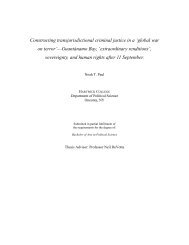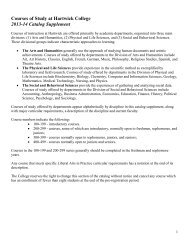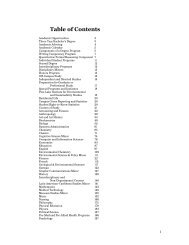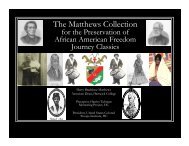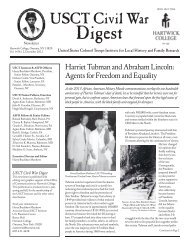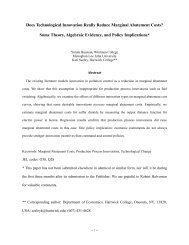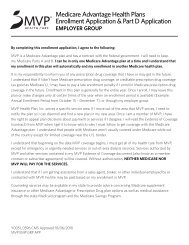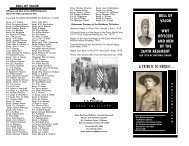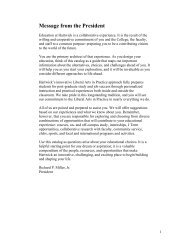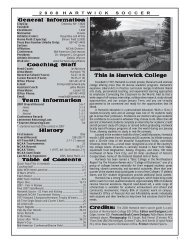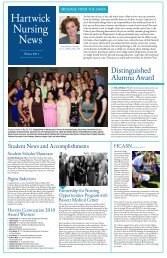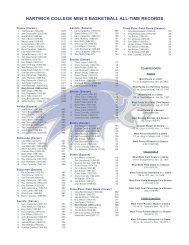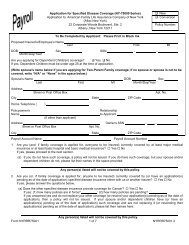Table of Contents - Hartwick College
Table of Contents - Hartwick College
Table of Contents - Hartwick College
You also want an ePaper? Increase the reach of your titles
YUMPU automatically turns print PDFs into web optimized ePapers that Google loves.
adical movements; labor and the liberal state; and the post industrial<br />
service economy. (WHS)<br />
150 Introductory Topics in History (3 credits) From time to time the<br />
department will <strong>of</strong>fer courses for small groups <strong>of</strong> students, particularly<br />
freshmen. Students may elect Hist 150 more than once, provided they do<br />
not repeat the same topic.<br />
Perspectives in Global History: These foundational courses examine<br />
the eras in global history from the perspective <strong>of</strong> a particular critical lens.<br />
160 Topics in Modern Global History: Theories <strong>of</strong> World History and<br />
Points <strong>of</strong> Cultural Convergence (3 credits) This course will introduce<br />
students to theories about World History and conceptions <strong>of</strong> the passage <strong>of</strong> time<br />
in China, India, Africa, the Middle East, the Americas and Europe, and then use<br />
specific events <strong>of</strong> cultural encounter to discuss the value <strong>of</strong> global historiography.<br />
The first half <strong>of</strong> the course will cover Chinese dynastic theory, Indian Vedic texts,<br />
Arabic Tarikhs, African memory schemes, Amerindian oral traditions and the<br />
Western historical tradition <strong>of</strong> dialectics, from Hegel to Marx. The second half<br />
will discuss events such as Columbus’ voyages in the Americas, the Indian<br />
Mutiny, the Boxer Rebellion, Captain Cook in Hawaii, Lawrence <strong>of</strong> Arabia, and<br />
the story <strong>of</strong> the ‘Hottentot Venus.’<br />
161 Pre-Modern Roots <strong>of</strong> Cultural Diversity (3 credits) This course<br />
will introduce students to the diverse cultures <strong>of</strong> the pre-modern world.<br />
The descriptions and analyses <strong>of</strong> these cultures will highlight their distinct<br />
religious and ethical systems and their definitions <strong>of</strong> political identities.<br />
Following a survey <strong>of</strong> the historical roots <strong>of</strong> these cultural and political<br />
systems, the course will examine their distinct responses to world wide<br />
crises in political and social order from the third to tenth centuries C.E.<br />
The final section <strong>of</strong> the class will survey the world in the century prior to<br />
the era <strong>of</strong> European oversees expansion. (NTW)<br />
162 Human Civilization and the Natural World since 1500 (3<br />
credits) A survey <strong>of</strong> social, political, cultural and economic developments<br />
in world history, focusing on the diversity <strong>of</strong> cultural perspectives on<br />
humanity’s relation to the natural world, the use <strong>of</strong> material resources,<br />
and the organization <strong>of</strong> production. Major themes will include<br />
exploration; trade routes and global economy; comparative systems <strong>of</strong><br />
explaining the place <strong>of</strong> human beings in the world (science, philosophy,<br />
religion); and the relationship between these scientific, philosophical,<br />
religious systems, and dominant political and social orders. (NTW)<br />
164 Race and Identity (3 credits) How do you define “race” in the<br />
United States? How do you identify yourself? Are you aware how other<br />
people (and society) label you as a member <strong>of</strong> a certain racial group? Are<br />
there any critical conflicts between society’s categorization and individual<br />
identities? How can the notion <strong>of</strong> race differ in a specific historical<br />
context? Could your individual racial identity change in a different time<br />
and space? This course discusses various important issues <strong>of</strong> race and<br />
identity not only in the U.S. but also in other parts <strong>of</strong> the New<br />
World with a comparative historical perspective. (FYS)<br />
165 Free and Unfree Labor (3 credits) This course is a survey <strong>of</strong> world<br />
labor history, focusing on the period 1500-present. The first unit<br />
examines the various forms <strong>of</strong> unfree labor, including serfdom, slavery,<br />
144



